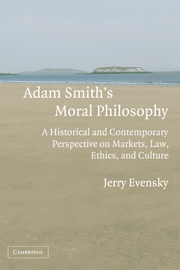 Adam Smith's Moral Philosophy
Adam Smith's Moral Philosophy Book contents
- Frontmatter
- Contents
- Preface
- Adam Smith's Moral Philosophy
- PART ONE ON ADAM SMITH'S MORAL PHILOSOPHICAL VISION
- PART TWO ON THE PLACE OF THE WEALTH OF NATIONS IN ADAM SMITH'S MORAL PHILOSOPHICAL VISION
- PART THREE ON ADAM SMITH'S MORAL PHILOSOPHICAL VISION AND THE MODERN DISCOURSE
- 10 “Chicago Smith” versus “Kirkaldy Smith”
- 11 Toward a Dynamic Three-Dimensional Analysis
- 12 The Liberal Plan and the Quandary of Capital
- Epilogue: On the Human Prospect
- References
- Index
12 - The Liberal Plan and the Quandary of Capital
Published online by Cambridge University Press: 11 November 2009
- Frontmatter
- Contents
- Preface
- Adam Smith's Moral Philosophy
- PART ONE ON ADAM SMITH'S MORAL PHILOSOPHICAL VISION
- PART TWO ON THE PLACE OF THE WEALTH OF NATIONS IN ADAM SMITH'S MORAL PHILOSOPHICAL VISION
- PART THREE ON ADAM SMITH'S MORAL PHILOSOPHICAL VISION AND THE MODERN DISCOURSE
- 10 “Chicago Smith” versus “Kirkaldy Smith”
- 11 Toward a Dynamic Three-Dimensional Analysis
- 12 The Liberal Plan and the Quandary of Capital
- Epilogue: On the Human Prospect
- References
- Index
Summary
ADAM SMITH, THE LIBERAL PLAN, AND THE QUANDARY OF CAPITAL
One last issue that concerned Smith is worthy of note: The quandary of capital in a liberal, free market system.
This quandary can best be described as follows: The accumulation of the capital necessary for the progress of opulence, described in Chapter Six, seems to give rise to a class of accumulators who, being few in number, enjoy a concentrated of control over capital that empowers them to extort market advantages, either directly or through government, in pursuit of greater returns on their capital. This quandary became the foundation of Marx's critique of capitalism and was a central concern of such leading liberal economic lights as John Stuart Mill and John Maynard Keynes. Smith was concerned about this issue in 1776.
In WN Book I Chapter 5, Smith describes how concentrated control over capital among a few “masters” makes it possible for “[m]asters [who] are always and every where in a sort of tacit, but constant uniform combination … sometimes … to sink the wages of labour below …[their natural] rate” (WN, 84). When the workers form a “defensive combination” and “clamour” for higher wages, “[t]he masters upon these occasions are just as clamorous upon the other side, and never cease to call aloud for the assistance of the civil magistrate, and the rigorous execution of those laws which have been enacted with so much severity against the combinations of servants, labourers, and journeymen” (WN, 84–5).
- Type
- Chapter
- Information
- Adam Smith's Moral PhilosophyA Historical and Contemporary Perspective on Markets, Law, Ethics, and Culture, pp. 289 - 307Publisher: Cambridge University PressPrint publication year: 2005


